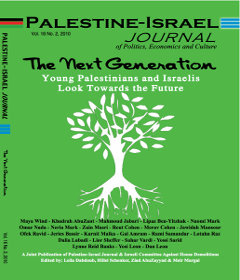"Whether my essay will win or not, I want to thank you for causing me to put my feelings down on paper. It was a very meaningful experience." That was the reaction of Neriya Mark, one of the Israeli participants in the first Simcha Bahiri Youth Essay Prize Contest organized by the Palestine-Israel Journal . Neriya was one of the young Israelis and Palestinians who participated in the award ceremony which took place at the Writers' House in Tel Aviv on Aug. 11, 2009, before an overflow crowd.
Following the fighting in Gaza, the topic chosen for this year's contest was "The day after the Gaza War: What can young people do to strengthen the prospects for peace?" and the contest was open to Israelis and Palestinians aged 17-24. The ceremony recognized 21 students from Israel, the West Bank and East Jerusalem, who took on the task of challenging themselves and others with their stirring words.
Bahiri's BrainchildThe contest was the brainchild of Bronx-born Dr. Simcha Bahiri, a member of the Palestine-Israel Journal Editorial Board who, at the young age of 82, after working with the Ford Foundation in Africa, the Armand Hammer Economic Peace Research Center at Tel Aviv University and with Prof. Seymour Melman at Columbia University on economic conversion (that's just the abbreviated list), is still coming up with new, innovative ideas.
"This prize is dedicated to young creativity about issues related to peace and understanding," said Journal Co-Editor Ziad AbuZayyad, who was one of the evening moderators together with Co-Editor Hillel Schenker.
Yet, the reality of the occupation shadowed the day in which Israeli and Palestinian youths convened together in an open dialogue toward peace, as Palestinian contestant Rami Samandar from Ramallah had problems receiving a permit to come to Tel Aviv and was unable to attend.
Remembering Victor Cygielman: A Rare, Courageous and Modest IndividualThe award ceremony, which also served as a tribute to PIJ Co- Founding Editor Victor Cygielman, was a combination of inspirational stories and anecdotes, lighthearted humor and melodies from the acoustic guitar of Israeli musician Danny Amir.
Cygielman's youngest daughter, journalist Anat Cygielman, read some relevant words her father wrote in Hebrew after the Six-Day War of 1967, in which he warned about the potential dangers involved in the question of how Israel would relate to the newly occupied territories. Cygielman paraphrased Marx, saying that "a nation which represses another nation cannot be free."
Ambassador Avi Primor, who served as Israeli ambassador to the European Union (EU) and Germany, described how he originally viewed Cygielman as a dangerous critic of Israeli policy and, eventually, learned to appreciate his honest dedication to the facts, particularly connected to specific instances of the use of torture by the Israel Defense Forces (IDF), which could not be contradicted by the Israeli authorities. Primor grew to see him as "an authentic Israeli patriot and a really rare courageous man. I think our job is to see to it that there will be many more Victor Cygielmans," he concluded.
Prof. Daniel Bar-Tal of Tel Aviv University, Cygielman's successor as Israeli co-editor at the journal, remembered him as a unique person who embodied the virtues of wisdom, modesty and sensitivity and commented on the importance of youth. Making a connection between a tribute to the past and the future, he said that "the Simcha Bahiri Youth Essay Prize Contest is one of the few lights in the darkness we live in today. It shows that there are young people who, in spite of the darkness, are able to provide hope by seeing not only the dead-end way that the present society is going, but also offer an alternative direction."
Youth, the Key to the FutureYoung people from Jenin, Tel Aviv, Tulkarm, Beersheba, Nablus, Jerusalem (West and East), Tiberias, Rehovot, Galil Yam, Ramallah, Rosh Ha'ayin and Hebron participated in the ceremony.
AbuZayyad acknowledged the efforts Palestinian youths put into obtaining the permits to travel from the West Bank to Israel. "It wasn't easy, but they were really persistent and stubborn," he said.
Khadrah Jean Jaser AbuZant, 19, from Tulkarem and Maya Wind, 19, from Jerusalem won the first prize of $1,000 cash each, donated by PIJ Editorial Board member Dr. Simcha Bahiri.
Israelis Neriya Mark and Naomi Mark (yes, they are sisters) and Palestinians Zain Masri and Omar Nada won the second prize.
The other participants in the competition were Jeries Bassir, Karnit Malka, Jalla' Majid Abu Arab, Chen Amram, Raba'a Ibrahim Salah, Gal Amram, Jawidah Mansour, Hofit Raz, Rami Samandar, Lipaz Ben-Yitzhak, Mahmoud Jabari, Reut Cohen, Majd Muhammad Husein, Merav Cohen and Ofek Ravid. They were all presented with a PIJ contest certificate.
Although Rami Samandar did not make it through the checkpoint, family members and friends of the other participants clapped their hands when AbuZayyad announced his name.
Gender EqualityThe participants also received copies of the book Portraits of 30 Palestinian and 30 Israeli Women , which were donated by Peace X Peace founder, Patricia Smith Melton, and Elana Rosenman, co-director of Women's Interfaith Encounter in the Middle East.
Schenker noted that when it comes to gender equality, a goal that the PIJ always aspires towards, "the two first prize winners and three of the four second prize winners are young women, demonstrating that there is clearly hope for the future."
Schenker and AbuZayyad encouraged students to continue the ongoing exchange and dialogue through e-mails and meetings, which will be facilitated by the PIJ .
"All we are saying is give peace a chance," sang Danny Amir at the close of the ceremony, adding a few Middle East-relevant names and words of his own to the John Lennon song, one of them being "Obama."

